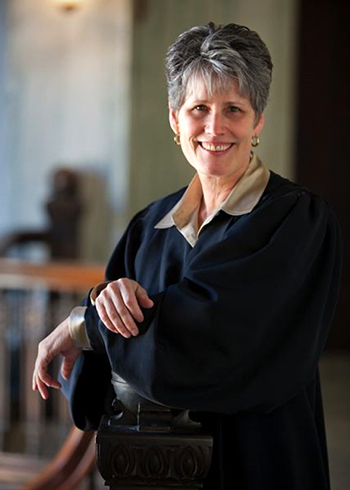Community Profile:
Virginia Linder
By George T. Nicola
Last updated March 27, 2017
Salem, Oregon area resident Virginia Linder retired at the end of 2015 after a long and distinguished legal career. During that period, she never attempted to hide her lesbianism. In the process, she became a major role model for LGBTQ Americans, especially those who want to pursue the legal profession.
 After graduating from Willamette University Law School in 1980, Virginia remained in Salem. There she began her career as an Assistant Attorney General in the Appellate Division of the Oregon Department of Justice. In 1984 she was appointed Assistant Solicitor General of Oregon. In 1986, at the age of 33, she was appointed Oregon Solicitor General, the first woman to hold that position.
After graduating from Willamette University Law School in 1980, Virginia remained in Salem. There she began her career as an Assistant Attorney General in the Appellate Division of the Oregon Department of Justice. In 1984 she was appointed Assistant Solicitor General of Oregon. In 1986, at the age of 33, she was appointed Oregon Solicitor General, the first woman to hold that position.
In 1992, Colorado voters adopted Measure 2, a state constitutional amendment that prevented any state or any local government body in the state from banning sexual orientation discrimination. The lawsuit that ensued, Romer v. Evans, went all the way to the U.S. Supreme Court.
Pioneer straight ally Ted Kulongoski was Oregon Attorney General at the time. He submitted an amicus (friend of the court) brief for Oregon in opposition to the Colorado measure. He asked Virginia, who was still Solicitor General, and Rives Kistler, at that time an Assistant Attorney General (currently an openly gay Oregon Supreme Court Justice), to craft the brief on Oregon’s behalf. They hoped other states would add their names to the briefs, but officials in many other states were doubtful that a brief opposing the State of Colorado on the issue could be written from a “state’s perspective”. They succeeded, however, and the same number of jurisdictions joined them in opposition to Colorado’s measure than joined the state amicus brief that was filed in support of Colorado’s measure.
As Virginia explains it, Oregon’s amicus brief pointed out that the Colorado statute was unique from other discriminatory measures passed in recent decades in that it specifically authorized wide scale discrimination in all aspects of life against a discrete group. Most laws authorizing discrimination traditionally have been directed to specific kinds of discrimination, such as discrimination in housing, employment, government benefits, or providing a business service or accommodation. Oregon's argument was that the Colorado measure, by its terms, prevented the state from protecting sexual minorities from discrimination of any kind. Because of its breadth, it amounted to a measure that simply made all discrimination against that discrete class lawful, and amounted to nothing more than a policy favoring discrimination for discrimination’s sake. Such a policy, Oregon argued, could not be defended as a rational public policy choice. Similar reasoning appeared in one other of the many amicus briefs filed with the court in the Romer case but Oregon’s brief was the only one that presented it in this distinct way, and the only brief in which several states stood together to oppose another state on the issue.
Oregon's argument is considered by many to have formed the basis of U.S. Supreme Court Justice Anthony Kennedy’s ruling in overturning Amendment 2. He reasoned that the measure, because of its breadth in withdrawing government protection from discrimination in a seemingly “limitless number of transactions and endeavors that constitute ordinary civic life in a free society” lacked any rational relationship to legitimate state interests, and that it was instead based solely on animus toward a specific group of people.
Kennedy’s reasoning became especially important in subsequent years because it was the basis of three other U.S. high court decisions advancing LGBTQ equality:
Writing for the Obergefell majority, Justice Kennedy reasoned through the issue within a specific context of discrimination that he—as the author of now four canonical gay rights decisions in recent Supreme Court memory—began building in Romer v. Evans and has developed throughout the rest of the quartet: Lawrence v. Texas, US v. Windsor and Obergefell. In each of these opinions, Kennedy has relied on concepts of animus and dignity to create a narrative—both emotional and doctrinal—of the experience of marginalization endured by sexual minorities under the law. Gradually, the connection between animus and dignity in these cases has crystallized into an anti-stereotyping principle, proven crucial for mediating from one gay rights case to another and for overturning discrimination in each instance at the court. (http://www.jurist.org/forum/2015/07/Jeremiah-Ho-Obergefell-Hodges.php)
Virginia was appointed to the Oregon Court of Appeals by Governor John Kitzhaber in 1997, and was elected (without opposition) to retain that seat in 1998 and 2004. In 2006, she launched her campaign for the Oregon Supreme Court to replace a retiring Justice. She was elected after facing two straight male opponents, each of whom outspent her by a considerable amount. Virginia’s campaign received contributions from the Gay & Lesbian Victory fund which strives to get openly LGBTQ people elected to public office.
Virginia was the first woman elected to the Oregon Supreme Court without first being appointed to fill a vacancy. She was also the first openly lesbian justice to serve on any supreme court in the nation, and the first openly LGBTQ person elected as a non-incumbent to any supreme court in the nation. She was re-elected in 2012. Her
retirement became effective on January 1, 2016, but she will continue to serve as a senior judge in Oregon trial and appellate courts for several years.
Sources of information for this article include:
- Wikipedia article on Virginia Linder at https://en.wikipedia.org/wiki/Virginia_Linder.
- Article “Animus and Dignity” at http://www.jurist.org/forum/2015/07/Jeremiah-Ho-Obergefell-Hodges.php
- The Oregon State Bar Diversity and Inclusion Story Wall at https://storywall.osbar.org/.
- Personal email correspondence with Virginia Linder. Additionally, Ms. Linder reviewed this entire article before publication
P.O. Box 3646 • Portland, OR 97208-3646 • info@glapn.org
Copyright © 2016, Gay & Lesbian Archives of the Pacific Northwest


